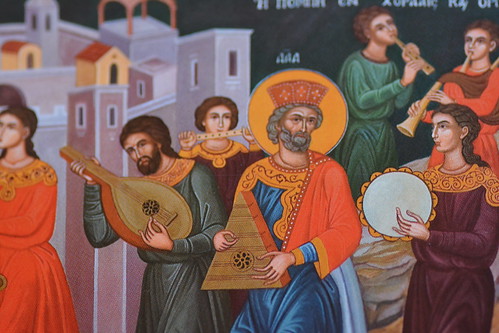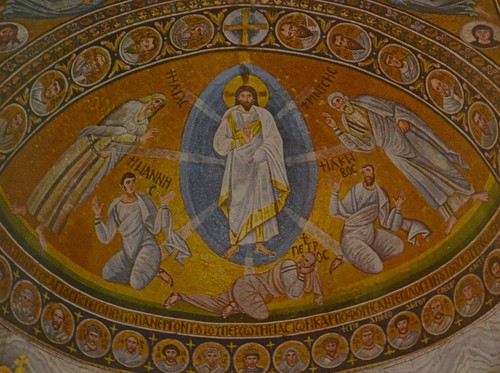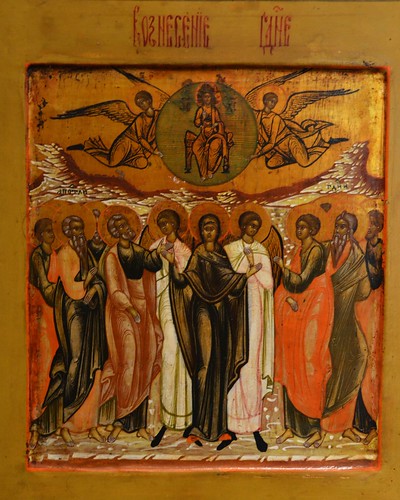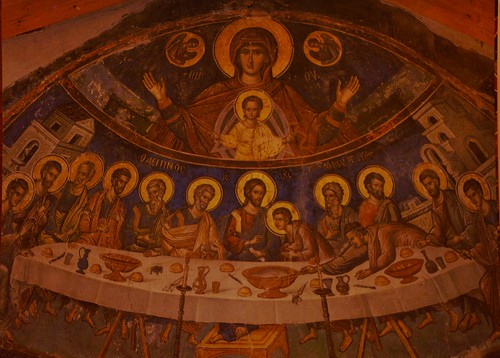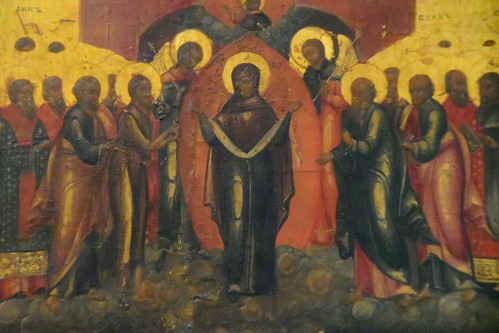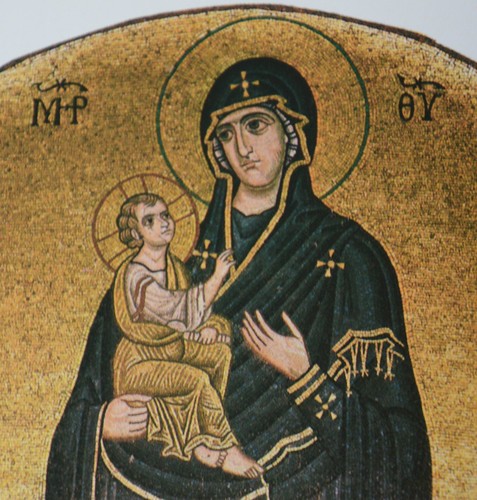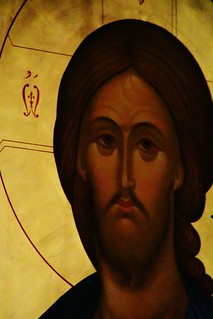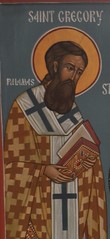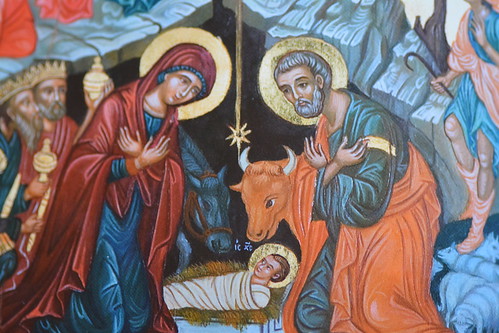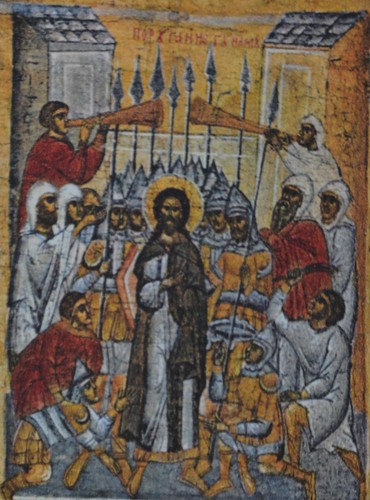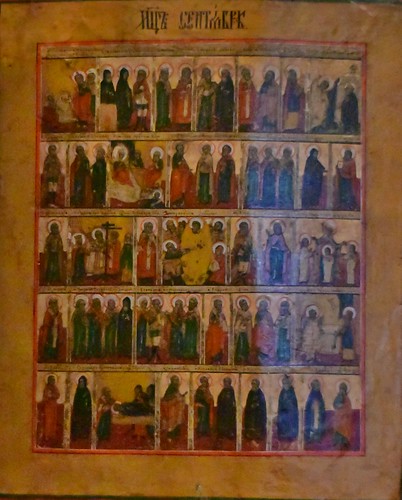Let each of you look not only to his own interests, but also to the interests of others. Have this mind among yourselves, which is yours in Christ Jesus, who, though he was in the form of God, did not count equality with God a thing to be grasped, but emptied himself, taking the form of a servant, being born in the likeness of men. And being found in human form he humbled himself and became obedient unto death, even death on a cross. Therefore God has highly exalted him and bestowed on him the name which is above every name, that at the name of Jesus every knee should bow, in heaven and on earth and under the earth, and every tongue confess that Jesus Christ is Lord, to the glory of God the Father. (Philippians 2:4-11)

The Scriptures reveal to us that Jesus Christ is both God’s image/ God’s icon and is in our likeness. We in turn are made in the image of the incarnate Christ.
All icons are forms of the theological artistry of Orthodoxy. Orthodoxy is one of the few forms of Christianity in which beauty is central to its theology and which has a unique art form, the icon, which is purely theological. The icon is said to be theology in lines and color. Truth and beauty are the same reality.
In Genesis 1:27 we hear, “God created a human in his own image, in the image of God he created him; male and female he created them.” The Bible has God being the first iconographer, for the word we read in English as “image” in Greek is icon. In a sense all icons are icons of God – and yet, they are icons of humans. They reveal the image of God in each holy person portrayed in the icon. For God came in the flesh (John 1:14) to reveal what we humans are to be, and to reveal that from all eternity God’s plan was to become human. The true human is in the image of God. As we read in John 10:34 – “Jesus answered them, “Is it not written in your law, ‘I said, you are gods’?”
And since we each have the image of God embedded in ourselves from the moment we are conceived, we too are able to share in the divine life. We do not have to begin our search for Christ or God out there somewhere, for the Kingdom of God is within each of us. We can find that icon which God put in our hearts. God’s own image is imprinted on each human. God is not just a God distant from us but is present in us. No amount of sin could take that away. No matter how sinful you are and no matter how distant you might feel God is, God is never further away than a prayer.

If we want to know something about this God who created us, all we have to do is look at the people around us, for each is created in the image of God. We learn about God and about ourselves through truly seeing others, not with our eyes, but truly from and through our own heart. This is why love for one another is so central to the teaching of Christ. It is the only way to see others in God’s image. It’s the only way to see the world as full human beings.
If we want to know what God had in mind as the perfect human being, we look not to the creation of Adam, but rather to the incarnate Christ. For Adam is created in the image of the incarnate Christ. It is not until Christ comes that we see upon whom Adam was modeled and only with Christ and in Christ do we see fully what it is to be human. We don’t go back in time to try to discover what Adam was at the beginning of creation, rather we look to who Christ is, even now in the Kingdom of Heaven.
In Orthodoxy, we think of Adam and Eve not created as the perfect human beings, but rather as a potential human beings. Eve and Adam were given opportunity to mature into perfect humans, but they like all of us chose to follow their own path rather than God’s. But we all have before us the potential to become the human beings God intended for us to be. That is the nature of the spiritual life, of taking up the cross and denying yourself to follow Christ. For Christ to become fully human, he had to empty himself. If we want to follow Christ and become fully human we too have to learn how to empty the self, to deny the self, so that we can be united to Christ.

Orthodoxy does not have Eve and Adam falling from the heights of perfection into some abysmal depraved state. You won’t find Orthodox Church fathers and mothers talking about original sin, a phrase that dominates in Western Christianity but was unknown in the Christian East.
A key phrase in the writings of St. Paul is
Therefore as sin came into the world through one human and death through sin, and so death spread to all humans because all humans sinned— (Romans 5:12)
It is not sin that spread to all humanity. We are not controlled by the power of original sin. It is mortality that has spread to all people, mortality is the true enemy of humanity. Death is what Christ came to destroy through his own life and resurrection. For us Orthodox, salvation is made known not on the cross but in the resurrection of Christ.

Adam and Eve were given free will and could choose their way to godly perfection, or not. But they, like each of us continued to be in the image of God. We never lose that perfect image of God in ourselves no matter how much we fail as humans or sin against God.
Eve and Adam were created to be who and what Christ is. If we want to know what a human being who is perfect would look like and do, we have to seek out Christ. For as St. Paul says
Christ is the image of the invisible God, the first-born of all creation; for in him all things were created, in heaven and on earth, visible and invisible… all things were created through him and for him. He is before all things, and in him all things hold together. He is the head of the body, the church; he is the beginning, the first-born from the dead, … For in him all the fulness of God was pleased to dwell, and through him to reconcile to himself all things, whether on earth or in heaven, making peace by the blood of his cross. (Colossians 1:15-20)

As Christians we are to share in that ministry of reconciliation which Christ began – uniting all things in heaven and on earth in Himself. What Christ is, we are to become. Again St. Paul writes
And we all, with unveiled face, beholding the glory of the Lord, are being changed into his image from one degree of glory to another; for this comes from the Lord who is the Spirit. (2 Corinthians 3:18)
In Christ, God became human that we humans might become like god, to become godly, to share in the divine life. This is always what God intends for us His human creatures.
In 1 Corinthians 15:47-49, St. Paul promises us:
The first human was from the earth, a human of dust; the second human is from heaven. As was the human of dust, so are those who are of the dust; and as is the human of heaven, so are those who are of heaven. Just as we have borne the image of the human of dust, we shall also bear the image of the human of heaven.
We are created to share Christ’s glory, which is to share the glory of the Lord.
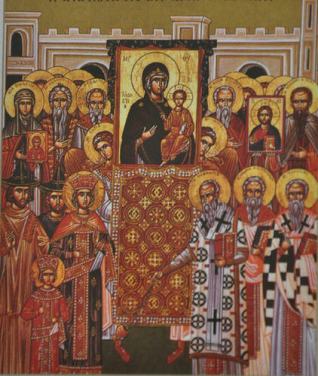
It is true that we share in Adam’s nature, we are made from the dust of the earth, which in turn is made from the dust of the stars. We share in Adam’s nature, but so too Christ has come to show us that our true nature is not in the dust but in the heavens and in the heavens of the heavens. In Christ we are united to divinity, we share in the life of the Holy Trinity. We experience that life on earth and are lifted from earth to heaven.
Put off your old nature which belongs to your former manner of life and is corrupt through deceitful lusts, and be renewed in the spirit of your minds, and put on the new nature, created after the likeness of God in true righteousness and holiness. (Ephesians 4:22-24)
We are in Orthodoxy endeavoring to be more human, not less. We are not trying to escape the earth or our bodies, for God came to earth to become incarnate as a human being. Spirituality and salvation both consist in deification, theosis, which means becoming more human, becoming like Christ, the God-man, in whose image we each are made. We each are to become, as St. Peter says (2 Peter 1:4), “partakers of the divine nature.”

( A message delivered on 20 September 2018 at Ohio Northern University)


